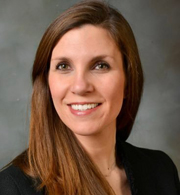
Collaborative Power in PLCs
By Amanda Szaraz | May 2024
 How do you collaborate with other school counselors when you are the only school counselor in your building? Who can you turn to for answers to ethical questions? When and how do you share best practices? Where can you actively engage in professional learning that is immediately relevant to your students and school setting?
How do you collaborate with other school counselors when you are the only school counselor in your building? Who can you turn to for answers to ethical questions? When and how do you share best practices? Where can you actively engage in professional learning that is immediately relevant to your students and school setting?Lone school counselors face many unique challenges, including finding opportunities to come together with fellow school counselors to engage in collaborative learning. Professional learning communities (PLCs) can be one way for all school counselors, lone or not, to engage in essential learning.
PLCs are poised to foster collaboration that enables school counselors to provide multitiered interventions and supports that directly enhance student achievement, social/emotional development and postsecondary planning and outcomes. As co-creator and co-leader of a PLC for school counselors in my district, I have seen firsthand the power that PLCs hold.
I am a lone school counselor for about 660 students, but I am fortunate that my district, Chicago Public Schools (CPS), is large, meaning there are hundreds of other school counselors in our city. Our district is subdivided into smaller networks, which are organized by grade levels served. This structure helped lay the foundation for the creation of more than a dozen elementary school PLCs in my district. My network’s PLC started in 2016 and was modeled on that of a neighboring network. At the core of all of our PLCs is a commitment to sharing effective practices that support the creation and continuation of data-driven, comprehensive school counseling programs. CPS’s PLCs are data-driven in that all school counselors are surveyed annually about their professional learning needs. Our PLCs also support school counselors in using outcome data to monitor the interventions they are providing within their schools. We are continually engaging with our PLC members so that our meetings are filled with useful and relevant professional development while also providing time for collaboration, resource sharing and program planning and development. Each meeting includes dedicated time for our school counselors to work on creating and updating their ASCA-aligned programs and completing documentation that outlines the elements of their comprehensive school counseling programs.
Kelsey Janese, a first-year school counselor in my network, shared: “The monthly PLCs have become my safe space on my calendar to help me learn the vital skills I need as a first-year counselor. It also gives me the space to collaborate with other, more tenured counselors on real-time cases happening within my school, work on my school counseling program plan with people who have been through the process before, and continue to be supported and celebrated on a monthly basis.”
My network’s PLC has evolved dramatically since its creation. We were initially focused on encouraging other school counselors to attend. Now our school counselors share professional practices and lead us through adult social/emotional learning activities on a monthly basis. Our district saw an influx of newcomer students this year, and our school counselors at schools that were welcoming these students and families found immediate connection and support in one another as they navigated this new phase in their school counseling journey. As a network, we were able to share resources and wish lists to secure essential supplies for our newest families. We’ve also worked together to continue to advocate in our individual buildings for protection of our time so that our focus is on providing direct and indirect student services, instead of completing non-counseling tasks like records and test coordination. We are truly stronger together and more equipped to have courageous conversations in our buildings because of the work we do in our PLC meetings.
Collaboration is essential for all school counselors and it can be a struggle to find the time or avenue to engage in this meaningful practice with others. Through engagement in a PLC, school counselors can learn directly from people in a similar role in real time, and share tools and resources they can use immediately in their individual schools. Much like all school counselors, our PLC is ever-evolving and ready to pivot at any moment to provide support and find the resources needed so no school counselor feels alone.
Amanda Szaraz is a school counselor at Pritzker Elementary School in Chicago and a member of the Illinois School Counselor Association Board of Directors.